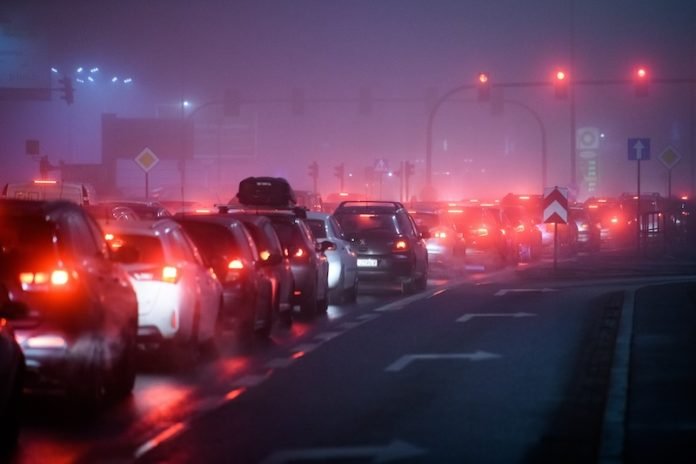
For over a century, American cities have grappled with the divisive impact of high-traffic roadways, such as interstate highways and bustling arterials, which have become defining features of urban landscapes.
These roads are major contributors to air pollution, with exhaust emissions, brake and tire wear, and road dust posing serious health risks to nearby communities.
While the long-term health consequences of traffic-related air pollution have gained attention, new research from the University of Washington spotlights the immediate danger faced by people traveling busy roads.
A recent study, published in the Annals of Internal Medicine, reveals that exposure to unfiltered air during rush-hour traffic significantly raises passengers’ blood pressure, both during the journey and up to 24 hours afterward.
Understanding the Health Risks
Long-term exposure to traffic-related air pollution has been associated with various health problems, including cardiovascular disease, asthma, lung cancer, and increased mortality rates.
However, the immediate impact of polluted air from traffic on passengers’ health has been less explored.
The Study’s Methodology
Led by Joel Kaufman, a physician and professor of environmental and occupational health sciences at the University of Washington, the study aimed to investigate how unfiltered road air affects blood pressure in a real-world setting.
The researchers conducted the study by driving healthy participants, aged 22 to 45, through Seattle’s rush-hour traffic while monitoring their blood pressure.
During two of the drives, the car’s interior received unfiltered road air, simulating the conditions many commuters experience. In the third drive, the car was equipped with high-quality HEPA filters that blocked 86% of particulate pollution.
Importantly, participants were unaware of whether they were experiencing clean or polluted air during each drive.
Alarming Blood Pressure Increase
The results were striking. Breathing unfiltered air led to a significant net increase in blood pressure, exceeding 4.50 mm Hg (millimeters of mercury) compared to drives with filtered air.
This increase occurred rapidly, reaching its peak approximately an hour into the drive and persisting for at least 24 hours. The size of this blood pressure surge is comparable to the effect of a high-sodium diet.
Even modest increases in blood pressure, like those observed in the study, are associated with a higher risk of cardiovascular disease on a population level.
Implications and Unanswered Questions
The findings suggest that roadway air pollution, even at relatively low levels, can substantially impact blood pressure and cardiovascular health.
This raises concerns about ultrafine particles, a poorly understood pollutant found in high concentrations in traffic-related air pollution. These ultrafine particles, smaller than 100 nanometers in diameter, were efficiently filtered during the study.
This hints at their potential significance in affecting blood pressure, although further research is required for conclusive evidence.
If you care about high blood pressure, please read studies about potatoes and high blood pressure, and top 10 choices for a blood pressure-friendly diet
For more information about high blood pressure, please see recent studies about impact of vitamins on high blood pressure you need to know, and the powerful link between high blood pressure and a potassium-rich diet.
The research findings can be found in Annals of Internal Medicine.
Copyright © 2023 Knowridge Science Report. All rights reserved.



